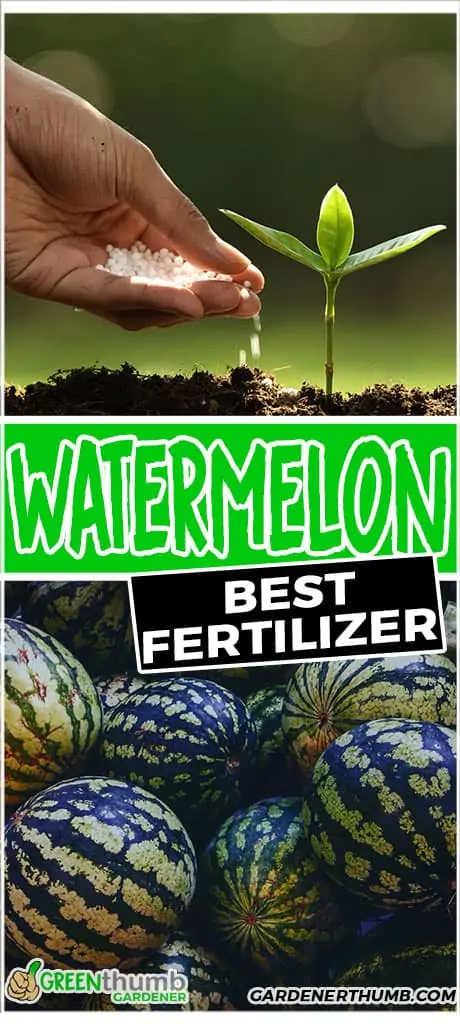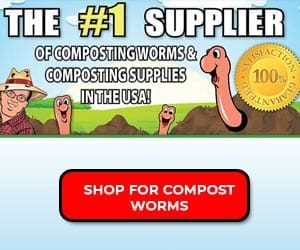Watermelon Fertilizer Tips (Prize Winning)
Last updated: 06/20/22
Over the years I’ve had many successes in my gardens. From peppers and tomatoes to fresh herbs and onions, my harvest has (for the most part) been plentiful. When it comes to growing watermelon, however, I seem to have fallen flat.
Year after year I’ve tried and failed to grow the round melon no matter the type, size, or location. I’ve tried Black Diamond Watermelon, Sugar Baby, and Charleston Gray Watermelon seedlings.
Heck, I’ve even attempted to use watermelon seeds from the fruit at the grocery store.
But learned some tricks from some watermelon farmers and found a few secrets & gardening tips from prize winning growers of watermelons to finally grow a big watermelon plant.
Ready to learn how to grow big watermelons and use fertilizers for watermelons the right way.
Green thumb Gardener occasionally links to product and/or services offered by vendors to assist you with all your gardening needs. Some of these may be affiliate links, meaning we earn a small commission if items are purchased.
Want to Download a Garden Hack Guide for FREE

Enter your email below and we will send you a guide to help you SAVE money in your garden.
Listen to this post on the Green thumb Gardener Podcast
Subscribe to the Green Thumb Gardener Podcast on iTunes, Spotify, Or Google Podcast HERE
Best Fertilizers For Watermelon
| Image | Product | Features | Price |
|---|---|---|---|
Great Overall  | Urban Farm Fertilizers All Purpose Vegetable Fertilizer, 1 gallon |
| Check Current Price |
Best For Root Veggies  | Espoma Organic Garden-tone 3-4-4 Organic Fertilizer |
| Check Current Price |
Good All Around 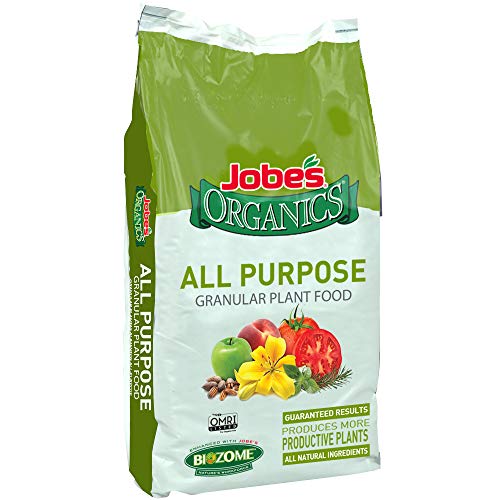 | Jobe’s Organics All Purpose Granular Fertilizer |
| Check Current Price |
Importance of Using Fertilizer for Watermelon
It turns out, watermelon plants like fertilizer! If you’re struggling to get your juicy round fruit to grow, this is probably the answer.
Watermelons are in the same family as other water-dense foods like cucumbers and zucchini, but unlike those veggies, watermelons are a hungry plant with tons of leaves. If you want your vine-filled leaves & fruit to be big and strong (and grow delicious melons) you need to feed it.
Many gardeners choose to include a slow-release fertilizer in their feeding schedule. By providing a constant source of nutrients your melons can absorb the vital elements it needs to grow while increasing the soil quality.
Other gardeners have soil that has different needs and use a water-soluble fertilizer in their watering schedule.
The nutrients in the food you choose to give your melons a huge impact on the growth of your melon plants & leaves. When you’re planting your melons its important to feed them with the vitamins and minerals they need with the right soil quality.
For example, the amounts of nitrogen has an effect on the rate of growth from the time it germinates until the last harvest of the year.
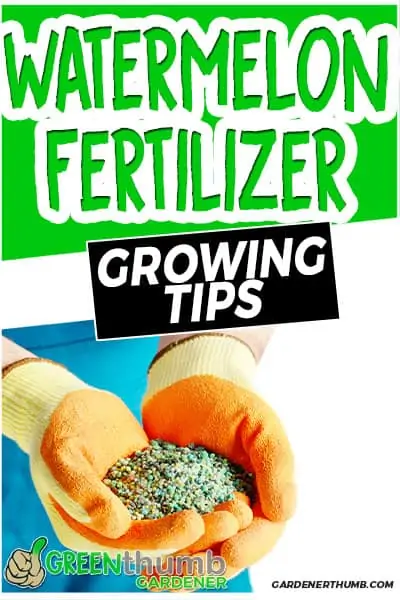
Additionally, things like phosphorus and calcium ensure your plant has a strong root system and continues to grow with the rest of your plant.
Magnesium, Iron, Boron, and Zinc also make sure your rind is smooth, your fruit fill is sweet, and your fruit flowers develop healthily!
Nutrient-Rich, Well-Drained soil is the best option for watermelon plants.
Watermelon Fertilizer Schedule
Because of the variants in soil, sunlight, rain, and other conditions, there is no set schedule that works for all watermelon gardeners.
A great place to start is by doing a soil test where you’d like to plant your melons. A soil test lets you know what nutrients you’re dirt has and what it is lacking which will give you a better idea as to which what type of fertilizer that you should use when you plant watermelon.
There are generalized fertilizers that you can use, which may work for many gardeners, but successfully growing large and tasteful melons has a lot to do with tailoring your plant food schedule to the exact needs of your soil.
Slow Release
Slow-release fertilizers allow for less frequent soil feeding as the nutrients break down over time and enter in the soil around your plants.
Adding the fertilizer within the top few inches of soil allows for the degrading of the nutrients into the root system of your plant.
As the nutrients from the food decompose the deep roots will get the nutrients they need as well.
Items like compost, NPK fertilizers, Miracle Grow, and bone meal all qualify under a slow-release system.
This allows for the watermelon plants to get the food they need throughout the growing season without the hands-on work that other types of fertilizing need.
Water Soluble
On the other hand, we have water-soluble fertilizers that can be done added to the liquid you use to water your plants. In most cases, you take granular fertilizers and a gallon of water to dissolve it and you’ll have enough for your fertilizing needs.
Each purchased bag of plant food has instructions that will give you a watermelon fertilizer ratio that will work best for your garden and you can find more information about organic blends with a bit of research.
You can purchase many inorganic blends by the pound or bag at the hardware or gardening store.
You’ll want to focus your watering efforts on the base of your plant ensuring the most nutrients enter the first few inches of soil.
With this method, you can use organic or inorganic types of fertilizing, but you just want to make sure you do not over-fertilize your soil and overwhelm the soil with nutrients (sometimes over-fertilized soil has nitrogen burn).
Sometimes you might need a soil test to make sure your dirt has the correct composition for your watermelons’ happiness.
No matter the category of fertilizer you choose, you have another decision to make. Organic or Inorganic?
Organic Material
You also have options of organic and naturally occurring fertilizers, (think fish scraps, compost tea, or seaweed fertilizer) that are a safe way to naturally build up the nutrients that would naturally occur in your soil.
This type of plant food is often favored by those gardeners that are looking for safe, sustainable, and environmentally friendly solutions.
However, with the organic matter, you may have to fertilize more frequently and soil testing may be necessary to make sure you’re on the path to good melons.
Inorganic Material
Those that are less concerned with environmental impact, are looking to save a few dollars and some time often turn to inorganic fertilizer. The content of these plant foods is scientifically created for success in your garden.
Think Miracle Grow, Lilly Miller fertilizer, Borax or other vegetable plant food that you can purchase.
These are often bought at your local hardware or garden store and have all of the nutrients (such as nitrogen, zinc, boron, and calcium) your watermelons need and specific instructions to assist you in your fertilizing tactics.
Vegetable plant food works best for different types of growing and growth seasons, so take some time to research the needs of your garden before you purchase.
11 Watermelon Growing Tips
1. Plant your melons in late spring or early summer in warm soil when the soil temperature is at least 70 degrees F.
2. Fertilize when you plant so your seedling starts out strong and encourage strong melon development. The fertilizer needs to penetrate the first few inches of soil.
3. When planting your melons, make sure they have ample room to vine-out when they are ready. The space between your melon plants should be a minimum of 6 feet apart.
If you do not have the garden space for watermelon, maybe start with a single plant to learn more about what works best for you.
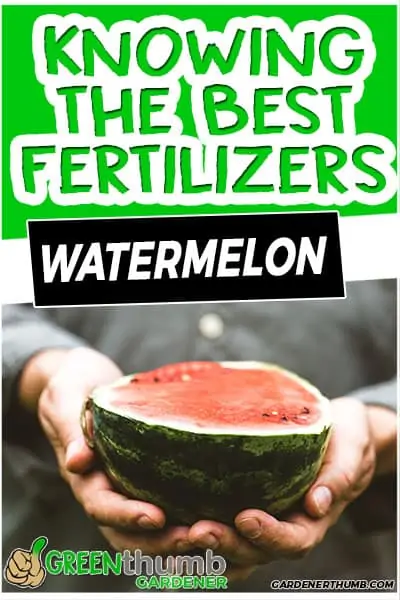
4. Use a straw to keep your baby melons off of the soil to assist in the growth and great coloring. As your melon grows, keeping it up and off of the soil itself will help prevent pests and fungal diseases from murdering your melons.
As an additional perk, the straw insulates the ground and will keep your soil moist for longer.
5. Weed around your melon plants before your vines start to run. Weeding around vines can be dangerous for your plants since you risk pulling the vines out or damaging them.
6. Avoid using sprinklers or overhead watering. Drip irrigation or ground watering works best. Also, make sure your fruit does not sit in puddles of water which can lead to fungal diseases and rotting.
7. Give your watermelons a steady source of fertilizer throughout the entire growing season. A healthy watermelon grows fast and developed the sugars needed to produce a great-tasting fruit.
8. A ripe watermelon will have a yellow underbelly where it touched the soil. The yellow color indicates a fresh melon that is high in sweetness.
9. Healthy vines = a healthy plant. Pay attention to the sturdiness, the plumpness, and the colors of your watermelon vines. The vine speaks to you much like the stem of a plant.
Healthy vines give you delicious fruit.
10. Watermelons have both male and female flowers. You’ll see the male flowers drop off early after blooming, DO NOT PANIC. The female flowers are the ones that will eventually produce the fruit.
11. Make sure your watermelon gets enough water. Drip irrigation works best, but if you need to water quickly, a soaker hose works well.

Further Reading
Final Thoughts
Watermelons are hungry plants! Just like people and babies, the vine-driven fruit needs a constant source of nutrients to produce and grow to its full potential, a plump and flavorful watermelon.
If you’re unsure as to what your watermelon needs, a lot of information can be gathered from a quick soil test to learn about the current soil condition of your garden.
By learning the soil structure you’ll find that there are so many ways to fertilize your plant that no matter your preferences you should be able to find one that works for you!
Related Questions
How do you increase watermelon fruit size?
It’s in the name! Watermelon needs ample water to grow. By making sure your melon never goes through a drought and by deep watering, your melon will grow.
Additionally, the application of fertilizer to your garden will ensure your watermelon grows to its full potential.
Is Miracle Grow good for watermelons?
Miracle Grow is a commonly used fertilizer that can often be a great thing for your watermelon plants. It’s important to learn about your soil composition to know what type and how much of any fertilizer you use, including Miracle Grow.

